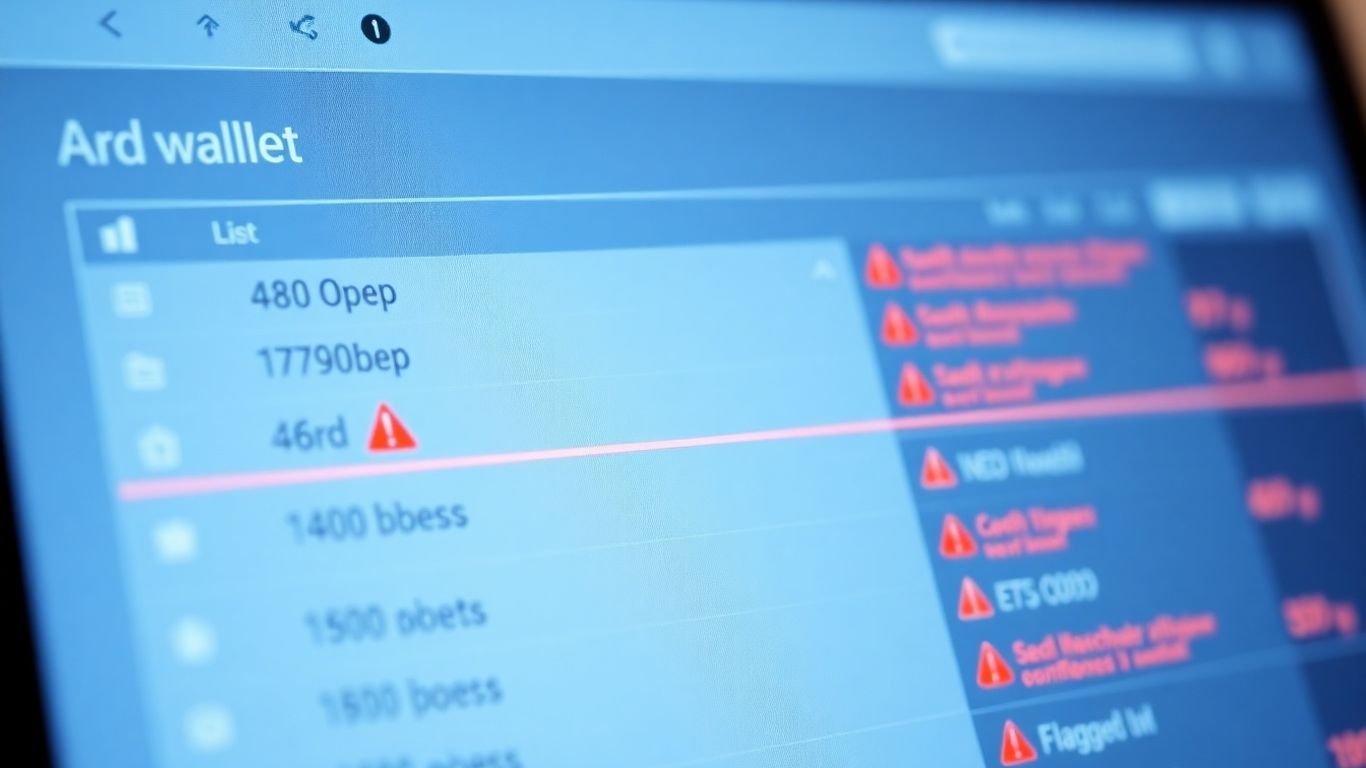[ newsletter ]
Stay ahead of Web3 threats—subscribe to our newsletter for the latest in blockchain security insights and updates.
Thank you! Your submission has been received!
Oops! Something went wrong. Please try again.
Explore wallet reputation, its history, and risk flags. Understand how wallet activity impacts DeFi access and learn strategies for secure wallet usage.





In the world of crypto, your wallet's history matters. It's like a digital reputation, and how you use it can open or close doors. We're going to look at why this wallet reputation is becoming so important, what's happened in the past to make it this way, and how you can keep your own wallet looking good.
Think of your crypto wallet as your digital passport in the Web3 world. It's not just a place to store your coins and NFTs; it's also a reflection of your activity and how you interact with the decentralized ecosystem. This is what we mean by 'wallet reputation'. It's a way to gauge the trustworthiness and risk associated with a particular wallet address.
In Decentralized Finance (DeFi), where trust is often built on code and transparency, your wallet's history matters. A wallet with a clean transaction history, one that hasn't been involved in known scams or exploited protocols, is generally seen as more reliable. This can make it easier to access certain DeFi services or participate in new projects. On the flip side, a wallet flagged for suspicious activity might find doors closed, limiting its ability to interact with the broader DeFi space. It’s like a credit score, but for your crypto activities.
Your wallet's past actions can directly influence your future opportunities. For instance, if a wallet has frequently interacted with high-risk smart contracts or has been linked to addresses associated with illicit activities, it might be flagged by various platforms. This flagging can lead to restrictions, such as being unable to participate in initial coin offerings (ICOs), access certain decentralized applications (dApps), or even trade on some decentralized exchanges (DEXs). The goal is to create a safer environment by identifying and isolating potentially risky actors.
We can start to see wallet reputation as a kind of digital credit score. Just as a traditional credit score tells lenders about your financial reliability, a wallet's reputation score can indicate its trustworthiness within the crypto ecosystem. This score isn't set in stone; it evolves based on ongoing transactions and interactions. Tools are emerging that analyze wallet activity, looking at factors like:
This evolving score helps users and platforms make more informed decisions, promoting a more secure and transparent digital asset environment. For example, services like Veritas Protocol use AI to assess wallet risk in real-time, helping to identify potential issues before they impact users.

Looking back, the history of crypto wallets is unfortunately also a history of breaches and hacks. It’s not just about losing your digital coins; it’s about the trust that gets broken. We’ve seen a lot of different ways attackers have tried to get in, and sadly, sometimes they’ve succeeded.
When we talk about major breaches, it’s often about how private keys or seed phrases get compromised. Think about it, these are like the master keys to your entire crypto kingdom. If someone gets their hands on them, everything is fair game. A lot of the time, this happens through sneaky methods like phishing scams or malware that’s designed to steal that sensitive information. Sometimes, it’s even simpler, like a user accidentally sharing their details or falling for a fake support scam. We saw this happen with wallets like Atomic Wallet, where security audits had actually flagged issues beforehand, but they weren't fully fixed. It’s a real shame when warnings are ignored.
Attackers aren't static; they adapt. Early on, it might have been more about exploiting simple bugs in code. But as the space matured, so did the attacks. We’ve seen a shift towards more sophisticated methods. For instance, in the first half of 2025 alone, over 50 major exploits led to billions in losses. Some of the biggest culprits were access control failures, compromised infrastructure, and just plain old logic errors in smart contracts. Cross-chain bridges and vault systems became particularly juicy targets, with billions lost due to private key thefts and contract manipulation. It’s a constant arms race, and staying ahead means understanding these new tactics.
Here’s a look at some common attack types:
The sheer volume of losses in early 2025, exceeding $2.7 billion, paints a stark picture of the ongoing security challenges in Web3. It’s a reminder that even popular platforms can be vulnerable.
The financial fallout from these hacks is staggering. We’re talking about billions of dollars vanishing. For example, the Bybit incident in early 2025 resulted in a loss of about $1.45 billion. Then there was the Cetus Protocol exploit on the Sui network, which drained $223 million. These aren't just numbers; they represent real people losing their savings. The Nobitex hack, where nearly $90 million was stolen and then deliberately burned, also highlights the varied motivations of attackers, sometimes making a political statement rather than just seeking profit. It really underscores why robust security measures and diligent due diligence are so important for everyone involved in DeFi.
So, you've got a wallet, and you're using it in the wild west of DeFi. That's cool, but sometimes, things can go sideways, and your wallet might get flagged as 'risky.' This isn't just a slap on the wrist; it can actually lock you out of certain platforms or services. It’s like getting a bad credit score, but for your crypto activities. Understanding what triggers these flags is the first step to keeping your digital reputation clean.
When we talk about transaction patterns, we're looking at how money moves in and out of your wallet. Think of it like a digital paper trail. If your trail looks a bit messy or leads to some shady places, that's a red flag. For instance, constantly moving small amounts of crypto through mixers or privacy tools can look like you're trying to hide something, even if you're not. Similarly, receiving funds from wallets known to be involved in scams or illicit activities, even if it's just a tiny bit, can taint your own wallet's reputation. It’s all about association, unfortunately. Even interacting with a wallet that was once linked to a sanctioned entity can cause issues. The key here is that even small, seemingly insignificant interactions can have a ripple effect on your wallet's standing.
Here are some common patterns that might raise eyebrows:
The decentralized nature of crypto means that while you have freedom, you also have responsibility. A single misstep, like accidentally interacting with a flagged address, can impact your ability to access various DeFi platforms. It’s important to be aware of these potential pitfalls.
People use various methods to increase privacy in crypto, which is understandable. Tools like privacy coins (Monero, for example) or advanced mixing services are designed to make transactions harder to trace. While these tools can be legitimate for privacy-conscious users, they are also heavily utilized by bad actors to launder money or hide illicit gains. Because of this, using these techniques can automatically flag your wallet as high-risk. Regulators and exchanges are increasingly scrutinizing transactions that involve these privacy-enhancing tools. It’s a bit of a double-edged sword: the more you try to hide your activity, the more suspicious it can look to automated systems designed to detect financial crime. This is why it’s important to understand the tools you’re using and their potential impact on your wallet’s reputation. For example, using privacy-enhancing tools can be a red flag.
Beyond just transaction history, your overall profile matters. This is where Know Your Customer (KYC) and Customer Due Diligence (CDD) come into play, even in the crypto world. If you're asked for information and provide incomplete or inconsistent details, or if you refuse to provide necessary documentation regarding the source of your funds, that's a major red flag. Think about it: if you were lending money, you'd want to know who you're dealing with. Similarly, DeFi platforms and exchanges need to verify user identities to comply with regulations. Irregularities in your personal information, like mismatched addresses or a history of using services known for weak KYC, can lead to your wallet being flagged. It’s about building trust, and that starts with a clear and verifiable identity. Performing due diligence on yourself, in a way, can help prevent these issues before they arise. For instance, if you're using a new exchange, check if it has robust KYC procedures.
Here’s a quick checklist for maintaining a clean profile:
Keeping your digital assets safe is a big deal, and honestly, it's not always as straightforward as it seems. Wallets are your main gateway into the crypto world, so making sure they're locked down tight is pretty important. It’s not just about having a strong password; it’s about building a whole system of defense.
Most modern wallets come with built-in security features, and it's wise to actually use them. Things like two-factor authentication (2FA) add a significant layer of protection. This means even if someone gets your password, they still can't access your wallet without that second verification step, like a code sent to your phone. Some wallets also offer multi-signature capabilities, which is a really smart move if you're dealing with significant amounts of crypto or if you want to share access with trusted parties. With multisig, multiple approvals are needed for a transaction to go through, making it much harder for a single point of failure to cause a problem. It’s worth looking into wallets that support hardware wallet integration too; these devices keep your private keys offline, which is the gold standard for security.
Think of your wallet like your financial health. You wouldn't just check your bank balance once a year, right? Similarly, keeping an eye on your wallet activity is key. This means regularly reviewing transaction history for anything unusual. Beyond your own checks, there are services that offer continuous monitoring, using AI to spot suspicious patterns or connections to known risky addresses. While full application audits are great, they can be costly and time-consuming. However, combining open-source development with a third-party bug bounty program can significantly boost a wallet's security profile. It’s about having eyes on the system constantly, not just at the beginning.
There are a few simple habits that make a huge difference. Always download wallet software directly from official websites or trusted app stores. Avoid clicking on suspicious links in emails or messages, as these are often phishing attempts designed to steal your login details. It’s also a good idea to segment your wallets – use different ones for different purposes, like one for daily trading and another for long-term holding. This way, if one wallet is compromised, your entire crypto holdings aren't at risk. Treating every interaction in DeFi as a visible transaction is a mindset that protects your wallet's reputation.
It’s easy to get caught up in the excitement of new projects and dApps, but always remember to do your due diligence. Connecting your wallet to unknown decentralized applications (dApps) can expose you to risks. Before connecting, research the dApp and consider using a burner wallet for initial interactions. This small step can prevent significant headaches down the line.
When setting up a new wallet, make sure to back up your seed phrase securely and store it offline. Never share your seed phrase or private keys with anyone. If you ever suspect your wallet has been compromised, act fast. Report suspicious activity to the relevant platforms and consider using tools that can help recover assets from compromised wallets, though these tools can't recover funds already stolen.
So, how do we actually keep tabs on all this wallet activity and make sense of it? It's not just about looking at one transaction anymore. We've got some pretty sophisticated tools popping up that help us get a clearer picture. Think of it like having a really detailed background check for your digital assets.
Artificial intelligence is really changing the game here. Instead of just looking at simple rules, AI can analyze massive amounts of data to spot patterns that humans might miss. It's like having a super-smart detective who can sift through millions of transactions to find the suspicious ones. These systems can predict potential risks before they even become a problem. For example, AI can look at how a wallet interacts with different smart contracts or how quickly funds move in and out to flag unusual behavior. It's not just about finding bad actors; it's about understanding the overall health of a wallet's activity.
We're starting to see services that give both wallets and smart contracts a "trust score." These scores aren't static; they update in real-time based on a whole bunch of factors. For smart contracts, it might look at the code itself, how it's been managed, and if it has a history of issues. For wallets, it's more about their transaction history, who they interact with, and if they've been linked to any risky activities. Getting a score from something like RubyScore can give you a quick idea of whether a wallet or contract is generally considered safe or if it's something to be cautious about. It's a way to quickly gauge the reputation of different players in the crypto space.
Sometimes, despite all the precautions, things go wrong. Wallets get compromised, and assets get locked up. That's where specialized tools come in for incident response. These aren't just about finding out what happened; they're about trying to get your assets back. Some solutions use advanced techniques, like bundling transactions privately to bypass hacker bots that try to steal any funds sent to a compromised wallet. It's a bit like a digital rescue operation. These tools can be a lifesaver when you're dealing with a hacked wallet, offering a way to recover funds that would otherwise be lost forever.
Here's a quick look at what these tools can do:
The complexity of the Web3 landscape means that relying on basic security measures is no longer enough. Advanced tools are becoming essential for anyone serious about managing their digital reputation and protecting their assets. They provide the depth of analysis needed to navigate an increasingly sophisticated ecosystem.

As we look ahead, the concept of wallet reputation is set to become even more central to how we interact within the decentralized web. It's not just about holding assets anymore; your wallet is increasingly becoming your digital identity, a passport to various services and platforms. This means the way we manage and perceive wallet activity will have to evolve significantly.
Governments and financial bodies worldwide are still figuring out how to regulate the crypto space. This means new rules and guidelines are likely to pop up, and they'll probably have a big impact on how wallet activity is tracked and judged. For instance, stricter Know Your Customer (KYC) rules could mean that wallets associated with certain activities might face limitations or require additional verification. Staying ahead of these changes will be key for both users and platforms.
Imagine a future where your wallet doesn't just hold your crypto, but also verifiable credentials about you – like your education, work history, or even your reputation in online communities. This is the promise of decentralized identity (DID). Your wallet could become a secure vault for these digital proofs, and the reputation tied to your wallet would reflect the trustworthiness of these credentials. This could really change how we build trust online, moving away from centralized identity providers.
With the constant threat of hacks and exploits, like the massive losses seen in early 2025 totaling billions, the need for robust security is paramount. Tools are emerging that use AI to analyze transaction patterns and identify risky behavior, offering real-time risk assessments for both wallets and smart contracts. For example, platforms are developing "Wallet Trust Scores" that analyze on-chain activity to flag potential issues.
The rapid pace of innovation in Web3 means security solutions must be equally dynamic. Relying solely on past audits is no longer enough; continuous, automated monitoring and AI-driven analysis are becoming the new baseline for protecting digital assets and maintaining a positive wallet reputation.
Here's a look at some of the advancements we're seeing:
So, we've looked at how wallet reputations work and why certain transactions get flagged. It's clear that the crypto world is still pretty new, and keeping your digital assets safe means staying aware. Things like connecting to sketchy sites or getting funds from unknown sources can really mess with your wallet's standing. Tools are popping up to help us check things out, but ultimately, it's on us to be careful. Think of your wallet's reputation like your own – it takes time to build and can be damaged quickly. Being smart about where your crypto goes and comes from is key to staying in the game and keeping your access to all the cool stuff DeFi has to offer.
Think of wallet reputation like a credit score for your digital wallet. It's a way to judge how trustworthy a wallet is based on its past actions and connections. A good reputation means the wallet is seen as safe and reliable, while a bad one might mean it's linked to risky activities.
In decentralized finance (DeFi), your wallet's reputation can affect whether you can use certain services. If your wallet is linked to bad stuff, like scams or stolen money, some platforms might block you. It's like having a bad credit score stopping you from getting a loan – it limits your access.
Hackers use many tricks! They might send you fake emails or messages to get your passwords (phishing), create fake websites that look real, or trick you into downloading harmful software (malware). Sometimes they even make wallet addresses that look similar to real ones to trick you into sending them money.
Be careful if a wallet's creators are unknown or shady, if the website address looks a bit off, or if the app has bad reviews and few downloads. Also, wallets that don't have strong security like two-factor authentication or that ask for too much personal info can be risky.
Always download wallets from official sources. Use strong, unique passwords and turn on extra security like two-factor authentication. Only connect your wallet to trusted websites and apps. It's also smart to test a new wallet with a small amount of crypto first before moving large sums.
If your wallet is flagged, you might have trouble using certain DeFi services or platforms. It can be hard to get your reputation back, so it's best to be careful with every transaction. Think of it like this: every time you interact online, you're building a digital trail that others can see.


